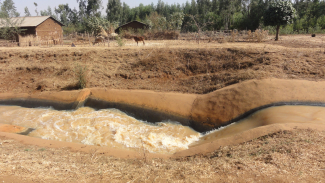The paper analyzes the economic impacts of climate change-induced fluctuations on the performance of Ethiopia's agriculture, using a countrywide computable general equilibrium (CGE) model. We model the impacts on agriculture using a Ricardian model, where current agricultural production is modelled as a function of temperature and precipitation, among other things, and where future agriculture is assumed to follow the same climate function. The effect of overall climate change is projected to be relatively benign until approximately 2030, but will become considerably worse thereafter.



